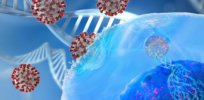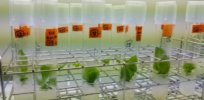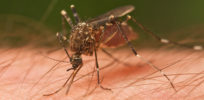University of Minnesota

25% of people who lost sense of smell and taste after COVID infection do not recover senses
Millions of Americans have been infected with COVID-19 since the pandemic of the novel coronavirus began in March 2020, and ...

Your personal genomic profile could guide treatment if you contract COVID
Over the past few months, a number of drugs have been under investigation to treat COVID-19 without well-established safety or data to ...

Gene editing could cut food additive use and put more nutritious options in supermarkets
[In 2019], Minneapolis-based Calyxt introduced a soybean oil without trans fats for commercial sale. It was the first gene-edited food ...

New technique may yield gene-edited plants in a few weeks, instead of 9 months
A University of Minnesota research team recently developed new methods that will make it significantly faster to produce gene-edited plants ...

Synthetic incompatibility: Preventing GMO mosquitos from spreading their genes
A major obstacle to applying genetic engineering to benefit humans and the environment is the risk that organisms whose genes ...

